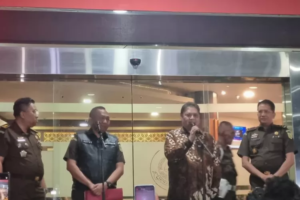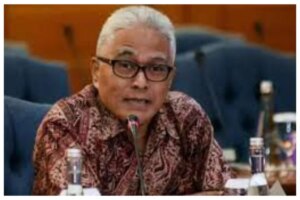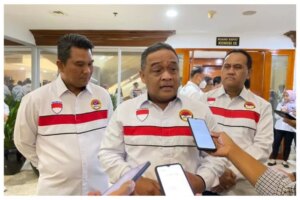MPR Reminds Judges to Implement MK-Fatwa MUI Decision on Different Marriage Application Granted Again

[ad_1]
BONSERNEWS.com – Deputy Speaker of the MPR Hidayat Nur Wahid regretted that the Central Jakarta Court judge granted the request for the registration of interfaith marriages (the groom is Christian, and the bride is Muslim), and reminded again that judges within the Supreme Court (MA) and the Supreme Court themselves must obey the decision of the Constitutional Court (MK) which refused to legalize interfaith marriages, as well as the MUI fatwa which rejected interfaith marriages (such as Muslim women being married to men who are not Muslim).
District court judges should invite and listen to the opinion of the MUI as the religious authority in Indonesia, if there is a request for legalization of a marriage if one of the bride and groom is Muslim. In the context of Indonesia as a country of law, judges must also obey the decisions of the Constitutional Court which are final and binding. Moreover, the Constitutional Court has repeatedly rejected requests for judicial review of the Marriage Law to allow interfaith marriages.
“The judges at the Central Jakarta district court who also granted the interfaith marriage request have ignored the principle of Indonesia as a rule of law, which recognizes that there is a hierarchy of laws that must be obeyed. With the Constitutional Court for the umpteenth time rejecting the legalization of interfaith marriages, that should be the main reference for PN judges, because according to the 1945 Constitution of the Republic of Indonesia, the Constitutional Court’s decision is final and binding, including binding on the judges within the Supreme Court,” he explained via a press release in Jakarta, Sunday 25 June 2023.
Also Read: Constitutional Judge Daniel Suggests the State Make a Marriage Book for Different Religions, Here’s Daniel’s Response
For information, HNW, as he is familiarly called, has repeatedly conveyed this matter, seeing the phenomenon of PN judges granting requests for the registration of interfaith marriages. Prior to the case at the Central Jakarta District Court, judges at the Surabaya District Court, Yogyakarta District Court, Tangerang District Court and South Jakarta District Court also did the same thing, even though this was not in accordance with the Constitution, Constitutional Court Decisions, the Marriage Law and the MUI Fatwa.
HNW assesses the views of the MUI and Muhammadiyah on various occasions – including in the judicial review trial regarding interfaith marriages at the Constitutional Court – which have repeatedly stated that interfaith marriages are not permissible based on Islamic religious rules and the Marriage Law. It should be listened to and referred to by the Judges.
Also Read: Knock! MK Rejects Request to Legalize Interfaith Marriage
“This should be the main guidance for judges when facing requests for “legalization” of interfaith marriages where one partner is Muslim,” he said.
“And the Supreme Court should discipline its judges to implement the provisions of the Constitution, obey the decisions of the Constitutional Court, refer to the Marriage Law, by also referring to the MUI fatwa. The Supreme Court needs to discipline judges under the authority of the Supreme Court, so that there is law and order in the Indonesian legal state, so that the problem of granting requests for interfaith marriages does not recur which unsettles society and disrupts social harmony within religious communities. So that legal behavior does not occur again which is not in accordance with the highest legal norms (UUD) and legal institutions with the highest authority (MK), and religious provisions that are recognized in the Indonesian legal state,” he said.
Apart from that, HNW also emphasized that the 1945 UUDNRI recognizes the existence of marriage but marriage is legal, and the benchmark is what is legal according to religious teachings. This is what is in accordance with the human rights guaranteed and permitted by the 1945 Constitution of the Republic of Indonesia, namely Article 28B paragraph (1) and Article 28J paragraph (2). This is what the Constitutional Court (MK) refers to when rejecting various requests for judicial review of the Marriage Law which wish to legalize interfaith marriages.
HNW criticized the consideration of the Central Jakarta District Court Judge who argued that he used sociological reasons in granting the request.
He stressed that Article 28B paragraph (1) expressly states that everyone has the right to form a family and continue offspring through a legal marriage. Meanwhile, what is meant by a valid marriage is what is regulated in the Marriage Law, namely if it is carried out according to the laws of each religion and its beliefs.
Indeed, continued HNW, the 1945 Constitution of the Republic of Indonesia allows human rights provisions, including Article 28B paragraph (1), to be limited. However, the limitation must refer to Article 28J paragraph (2) of the 1945 Constitution of the Republic of Indonesia, not with trivial and contrived reasons.
“The reasons for the restrictions referred to by the Constitution consist of several things, namely reasons of morality, religious values, security and public order. So, actually the UUD does not mention sociological reasons as a consideration, as was done by the judge at the Central Jakarta District Court. However, even if sociological reasons are used, they must still be in line with the provisions of the Constitution, including religious values, this is expressly stated in Article 28J paragraph (2) of the 1945 Constitution of the Republic of Indonesia, “he said.




